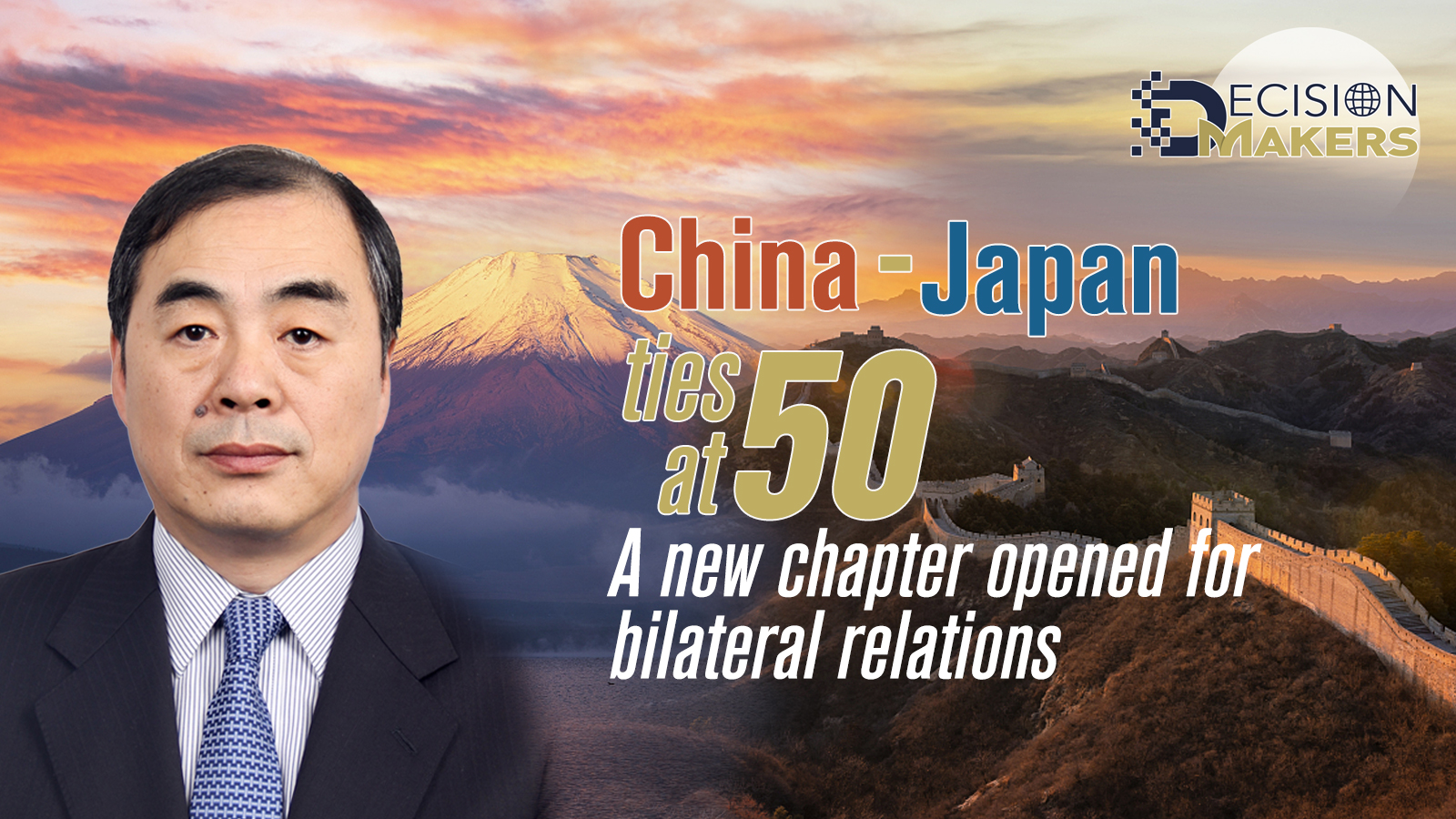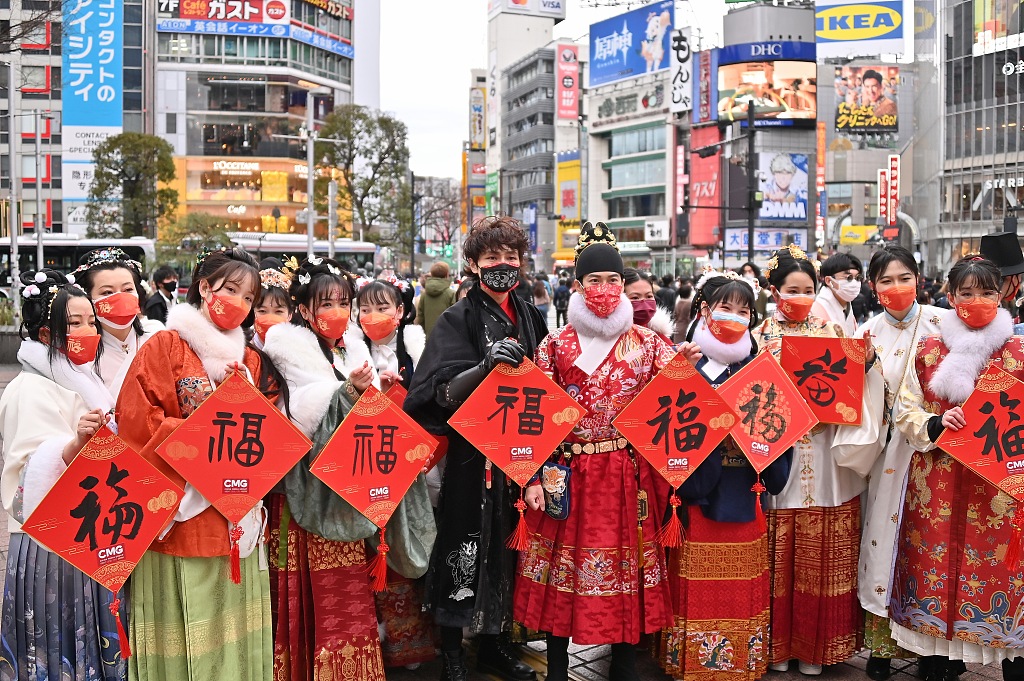
Editor's note: Decision Makers is a global platform for influential leaders to share their insights on events shaping today's world. Kong Xuanyou is the Ambassador Extraordinary and Plenipotentiary of the People's Republic of China to Japan. The article reflects the author's opinions and not necessarily those of CGTN.
This year marks the 50th anniversary of the normalization of diplomatic relations between China and Japan, an important milestone in the history of China-Japan relations. Fifty years ago, with superb strategic wisdom and extraordinary political courage, the leaders of the older generation on both sides made a major decision to normalize diplomatic relations, completely ending the post-war confrontation and isolation between the two countries, and opening a new chapter of peace, friendship and cooperation. It has a profound impact on the course of the history of the region and even the world.
After half a century of ups and downs in the China-Japan relations, the exchanges and cooperation between the two countries in various fields have achieved substantive progress, with bilateral trade reaching a record high of $371.4 billion, 12 million pre-pandemic mutual visits every year, and more than 260 pairs of sister cities. The two countries' interests are so broadly and closely integrated that they have long become an interdependent community of development. Both sides should cherish and hold fast to the hard-won development achievements of China-Japan relations and also draw wisdom from them to light up the path toward the future.
History has taught us that differences in political systems, social systems, and ideologies should not be an obstacle to state-to-state relations. Fifty years ago, in the spirit of mutual respect and seeking common ground while keeping differences, the leaders of the older generation on both sides went beyond their differences and normalized bilateral diplomatic relations in the context of the Cold War, setting an example of peaceful coexistence and friendly interaction between countries of different camps. It's clearly written in the 1972 Sino-Japanese Joint Statement that "in spite of the differences in their social systems, China and Japan should and can establish peaceful and friendly relations." Today, 50 years later, there is no reason why the two sides cannot do so.
History has taught us that peace, friendship and cooperation always represent the right direction that both sides should head in. At the very beginning of the normalization of diplomatic ties, China and Japan declared that they would "establish lasting peaceful and friendly relations between the two countries." The signing of The China-Japan Treaty of Peace and Friendship has clarified in legal form the obligation of both sides to work together for peace and friendship. The two sides also established a strategic and mutually beneficial relationship and reached a series of important consensuses, including "being cooperative partners and not posing a threat to each other." No matter how the international situation changes, the two sides should not waver in following the general direction of peace, friendship and cooperation.

Young people wearing traditional Chinese clothing Hanfu pose for pictures in the Shibuya Station in Tokyo, Japan, January 30, 2022. /VCG
Young people wearing traditional Chinese clothing Hanfu pose for pictures in the Shibuya Station in Tokyo, Japan, January 30, 2022. /VCG
History has taught us that the four political documents between China and Japan must be fulfilled without compromise. Since the normalization of diplomatic relations, the two sides have signed four political documents and formed a series of important consensuses, which have laid down rules for dealing with major issues of principle such as history and Taiwan region, as well as sensitive issues such as the Diaoyu Islands and the East China Sea. This is a solemn commitment made between the two governments and a fundamental guarantee to ensure that China-Japan relations will continue to develop steadily and will not be challenged in any way.
The current situation facing China-Japan relations remains complex and challenging, featuring both old and new issues, and is at a critical juncture where both countries either forge ahead or drift downstream. The two countries should seize the important opportunities presented by the 50th anniversary of the normalization of diplomatic relations to maintain, consolidate and develop bilateral relations, and translate the political consensus on building China-Japan relations that meet the requirements of the new era into a reality. This is the historical mission entrusted to both sides by the times.
First of all, both countries must uphold the principle of mutual respect and properly handle differences. Mutual respect is the premise and foundation for building mutual trust, and it is also the basic etiquette in state-to-state interactions. Both sides should treat each other as equals, show goodwill and sincerity, accommodate differences in each other's political systems, social systems and values, respect each other's independent choice of development path, adhere to basic norms of international relations such as non-interference in each other's internal affairs, and oppose the use of values as a pretext to draw lines and incite ideological confrontation.
Second, both countries must keep promises and manage conflicts and differences. As neighbors, China and Japan inevitably have some problems and differences, but the key lies in how to manage them. China has always been determined to safeguard its sovereignty, security and development interests. At the same time, China is willing to work with Japan to effectively manage conflicts and differences in accordance with the principles of the four political documents and relevant consensuses, so as to prevent disruptions to the big picture of bilateral relations. The Japanese side should keep its commitments on major issues of principle, such as history and Taiwan, and refrain from overstepping and crossing the line so as to maintain the political foundation of bilateral relations.
Third, both countries must seek mutually beneficial cooperation and expand common interests. As China enters a new stage of development, its high-quality development and high-level opening-up will bring more opportunities for all countries in the world, including Japan. China and Japan should hold high the banner of mutually beneficial cooperation, promote pragmatic cooperation in various fields, improve the quality of cooperation, and inject positive energy into the bilateral relations. We hope that the Japanese side will demonstrate a more confident, open and accommodating stance in its cooperation with China and will not be led astray by negative rhetoric that exaggerates the competition and confrontation between China and Japan and calls for containment of China.
Fourth, both countries must stick to the tradition of friendship and establish favorable public opinions toward each other. People-to-people friendship is a fine tradition and valuable asset of China-Japan relations. Both sides should carry out extensive people-to-people and sub-national exchanges to promote mutual understanding and deepen the bonds between the people of the two countries. The future of China-Japan relations lies with the younger generation. Both sides should focus on strengthening youth exchanges and attracting more young people to take an interest in the bilateral relations so that the cause of promoting China-Japan friendship can be passed on from generation to generation.
Fifth, both countries must uphold multilateralism and fulfill international responsibilities. At present, as the COVID-19 pandemic rages on and global challenges abound, the world has entered a new round of turbulent changes. Both China and Japan should practice genuine multilateralism, act in the interests of the international community, maintain strategic autonomy, and jointly play an important and positive role in maintaining peace and stability, solidarity and cooperation, and development and prosperity in the region as well as in the world.
Standing at the new starting point of the 50th anniversary of the normalization of diplomatic relations, I believe that both sides will have enough courage and wisdom to overcome difficulties, seize opportunities to usher in a new era of better China-Japan relations and bring a more mature and stable China-Japan relationship into the next 50 years, which is the best way of commemorating the 50th anniversary of the normalization of diplomatic relations.
(If you want to contribute and have specific expertise, please contact us at opinions@cgtn.com. Follow @thouse_opinions on Twitter to discover the latest commentaries on CGTN Opinion Section.)

